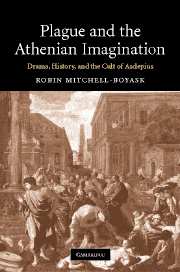Book contents
- Frontmatter
- Contents
- Preface
- Prologue
- Figure 1
- Chapter 1 Introduction
- Chapter 2 Death, myth and drama before the plague
- Chapter 3 Materials I: The language of disease in tragedy
- Chapter 4 Plague, cult and drama: Euripides' Hippolytus
- Chapter 5 Oedipus and the plague
- Chapter 6 The Trachiniae and the plague
- Chapter 7 Materials II: The cult of Asclepius and the Theater of Dionysus
- Chapter 8 Disease and stasis in Euripidean drama: Tragic pharmacology on the south slope of the Acropolis
- Chapter 9 The Athenian Asklepieion and the end of the Philoctetes
- Chapter 10 Conclusions and afterthoughts
- Works Cited
- Index
Chapter 2 - Death, myth and drama before the plague
Published online by Cambridge University Press: 22 September 2009
- Frontmatter
- Contents
- Preface
- Prologue
- Figure 1
- Chapter 1 Introduction
- Chapter 2 Death, myth and drama before the plague
- Chapter 3 Materials I: The language of disease in tragedy
- Chapter 4 Plague, cult and drama: Euripides' Hippolytus
- Chapter 5 Oedipus and the plague
- Chapter 6 The Trachiniae and the plague
- Chapter 7 Materials II: The cult of Asclepius and the Theater of Dionysus
- Chapter 8 Disease and stasis in Euripidean drama: Tragic pharmacology on the south slope of the Acropolis
- Chapter 9 The Athenian Asklepieion and the end of the Philoctetes
- Chapter 10 Conclusions and afterthoughts
- Works Cited
- Index
Summary
I begin with broad and general (and, probably to some, overly simplistic) thoughts about the poetics of mortality in Greek thought and their pertinence to discussing subsequently the response of the Athenian imagination to the plague. This foundation is a necessary prelude to the consideration of both disease language in Chapters 3–6 and the relationship between healing, poetry and theater in Chapters 7–9. From its beginnings in Homer's Iliad, Greek poetry broadly concerns itself with man's attempts to grapple emotionally and intellectually with the basic reality of his own mortality. As Sheila B. Murnaghan observes (Murnaghan 1992: 242), early Greek epic is “preoccupied with defining human life by exploring the line that separates men and gods.” In archaic epic, the heroic code posits that the hero receives “immortal glory” (kleos aphthiton) in return for risking an even earlier death than the normal men whose name dies with them, although they do live longer (Redfield 1975; Nagy 1979). The heroes live on through the songs of the poets. Near the beginning of the most important era of Greek drama, Pindar, in poems such as Pythian 3, promises to preserve the kleos of mortals through song and urges his listeners not to hope for more than their mortal lot. Athenian tragic drama itself, which draws its plots from the epics of the heroic age, thus by necessity continues the concern with the inevitability of death.
- Type
- Chapter
- Information
- Plague and the Athenian ImaginationDrama, History, and the Cult of Asclepius, pp. 8 - 17Publisher: Cambridge University PressPrint publication year: 2007



